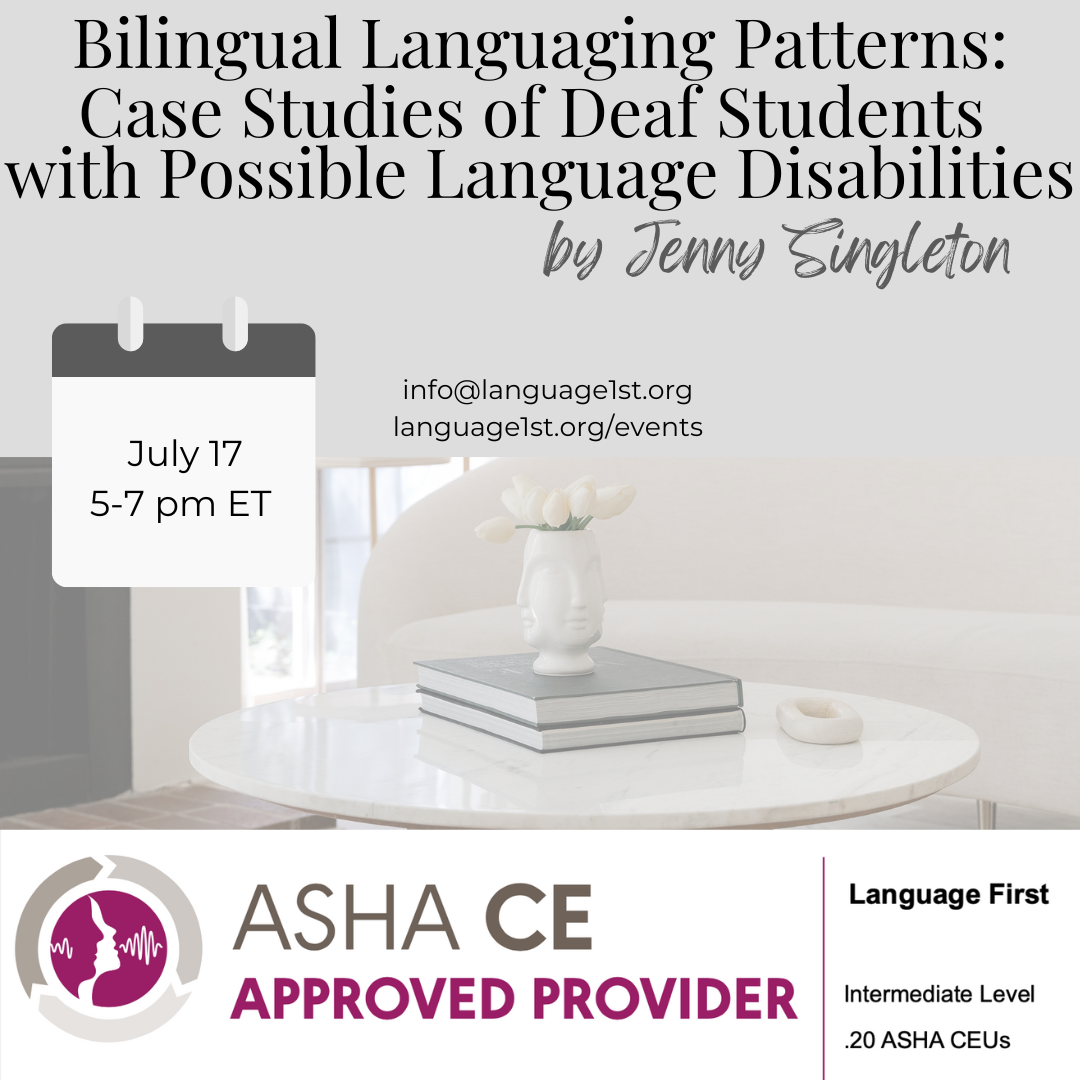This webinar will be hosted via Zoom for national and international attendees on Wednesday, July 17th, 2024 from 5:00 - 7:00 pm ET.
Speaker Disclosures:
Financial disclosures: Jenny is receiving an honorarium for presenting and receives a salary from Stony Brook University.
Nonfinancial disclosures: Jenny has no relevant nonfinancial disclosures.
Course Description:
I will present an overview of research describing some of the distinctive ASL/English bilingual languaging patterns produced by deaf/HH youth who appear to have underlying cognitive/language disabilities or neurodivergence. Some of my work, in collaboration with others, shows that these deaf signers produce effective innovations in their languaging – practices that can be understood and leveraged by teachers/interventionists. All too often, clinicians only document “language deficits”; we adopt a strengths-based approach that better captures the overall picture of their languaging practices and provides a more useful framework to support these student’s bilingual language development and promote full participation in their linguistic ecologies.
Agenda
5:00-5:15: Defining language variation among signers; distinctive languaging vs. Language Deprivation Syndrome
5:15-5:30: What is our professional responsibility to support DHH children with distinctive languaging patterns? What is Linguistic Care work?
5:30-6:00: 3 case studies of distinctive languaging (Alice, Adam, Brent)
6:00-6:30: Conceptualizing linguistic care work for DeafDisabled, DeafPlus, and Deaf-neurodivergent individuals
6:30-6:45: Service needs and gaps
6:45-7:00: Q&A
Learner Outcomes:
Participants will be able to:
Describe expectations and biases DHH professionals carry about disabled languaging
Increase research-based knowledge regarding bilingual (ASL/English) language patterns among natively ASL-exposed Deaf students with suspected developmental language disabilities
Describe how we, as professionals engaging DHH children, can more effectively conceptualize linguistic care work for DeafDisabled, DeafPlus, and Deaf-Neurodivergent individuals
Registration information:
This is a digital purchase only; no physical ticket is provided. A form will populate for you to complete your registration and then your purchase will be added to your cart in the upper right-hand corner of the screen. You will receive an email with instructions on how to participate as well as a Google Calendar invite with the Zoom link one week prior to the event. Registration ends one day prior to the webinar. All registrants will receive a copy of the presenter’s PowerPoint, the presentation recording, and a certificate of attendance. Please email info@language1st.org with any questions.
This webinar will be hosted via Zoom for national and international attendees on Wednesday, July 17th, 2024 from 5:00 - 7:00 pm ET.
Speaker Disclosures:
Financial disclosures: Jenny is receiving an honorarium for presenting and receives a salary from Stony Brook University.
Nonfinancial disclosures: Jenny has no relevant nonfinancial disclosures.
Course Description:
I will present an overview of research describing some of the distinctive ASL/English bilingual languaging patterns produced by deaf/HH youth who appear to have underlying cognitive/language disabilities or neurodivergence. Some of my work, in collaboration with others, shows that these deaf signers produce effective innovations in their languaging – practices that can be understood and leveraged by teachers/interventionists. All too often, clinicians only document “language deficits”; we adopt a strengths-based approach that better captures the overall picture of their languaging practices and provides a more useful framework to support these student’s bilingual language development and promote full participation in their linguistic ecologies.
Agenda
5:00-5:15: Defining language variation among signers; distinctive languaging vs. Language Deprivation Syndrome
5:15-5:30: What is our professional responsibility to support DHH children with distinctive languaging patterns? What is Linguistic Care work?
5:30-6:00: 3 case studies of distinctive languaging (Alice, Adam, Brent)
6:00-6:30: Conceptualizing linguistic care work for DeafDisabled, DeafPlus, and Deaf-neurodivergent individuals
6:30-6:45: Service needs and gaps
6:45-7:00: Q&A
Learner Outcomes:
Participants will be able to:
Describe expectations and biases DHH professionals carry about disabled languaging
Increase research-based knowledge regarding bilingual (ASL/English) language patterns among natively ASL-exposed Deaf students with suspected developmental language disabilities
Describe how we, as professionals engaging DHH children, can more effectively conceptualize linguistic care work for DeafDisabled, DeafPlus, and Deaf-Neurodivergent individuals
Registration information:
This is a digital purchase only; no physical ticket is provided. A form will populate for you to complete your registration and then your purchase will be added to your cart in the upper right-hand corner of the screen. You will receive an email with instructions on how to participate as well as a Google Calendar invite with the Zoom link one week prior to the event. Registration ends one day prior to the webinar. All registrants will receive a copy of the presenter’s PowerPoint, the presentation recording, and a certificate of attendance. Please email info@language1st.org with any questions.


